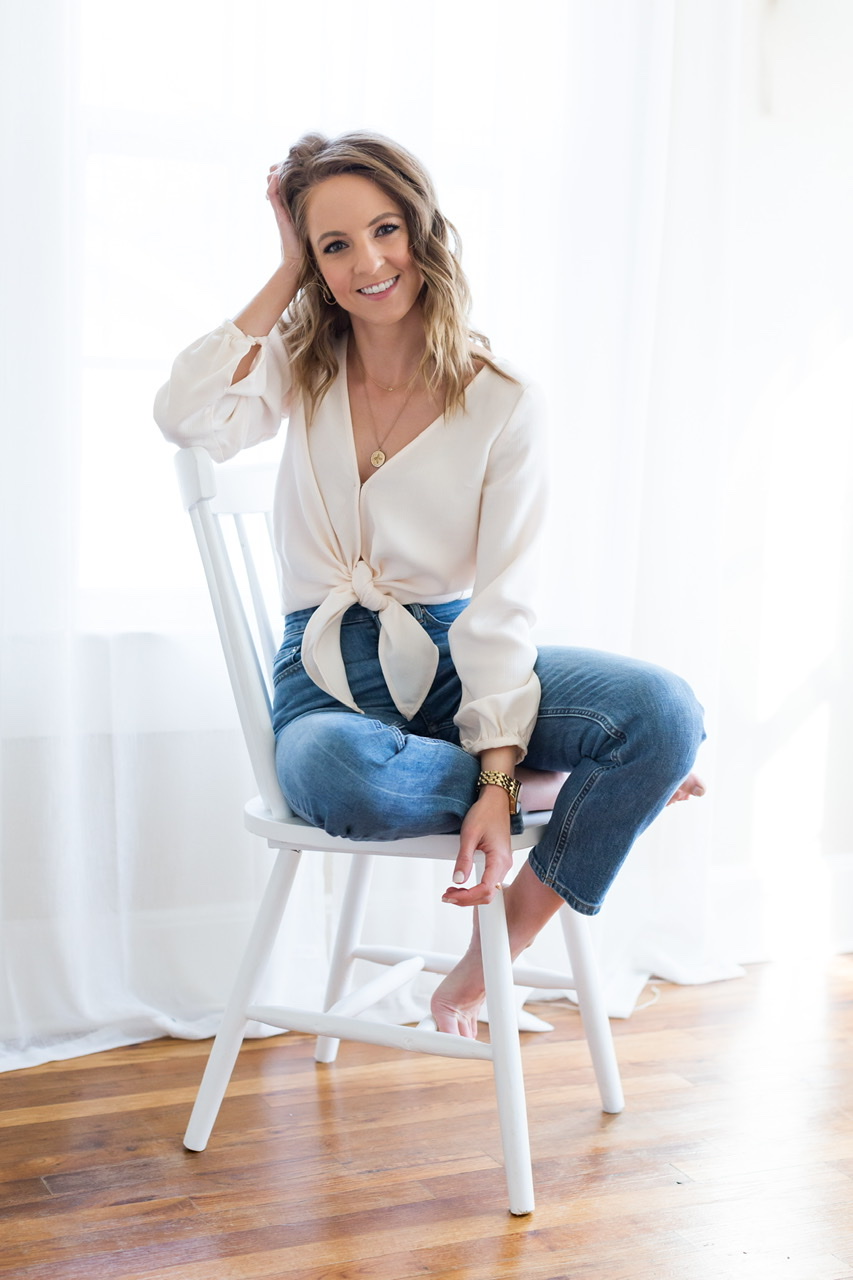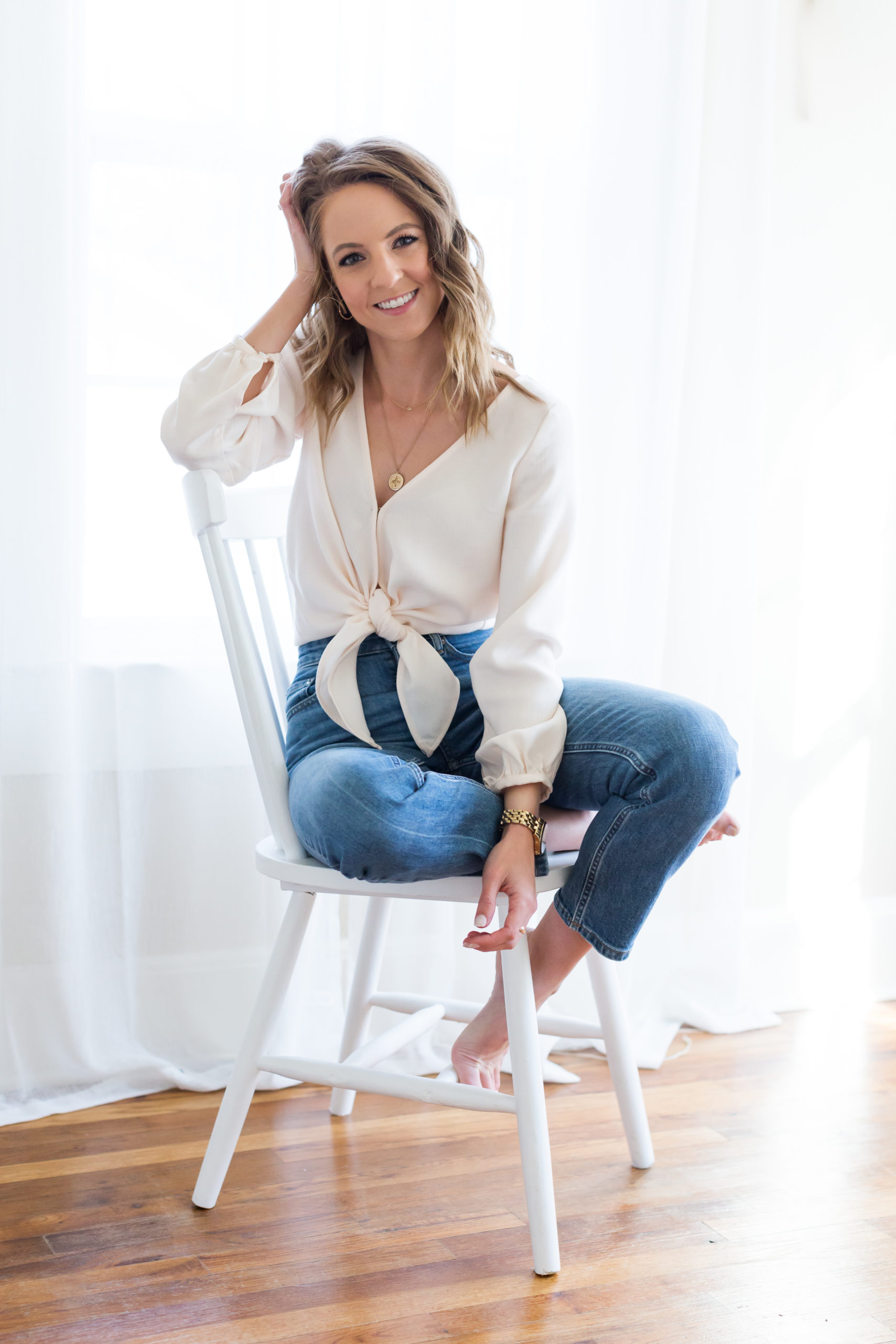About a year and a half ago I decided to start focusing my purchases toward buying ethical and fair trade clothes. I don’t really know exactly what spurred this shift, but at some point I had gained a *teeny tiny* bit of knowledge that the luxury of walking into Target and buying a cheap t-shirt was at the expense of people being treated unfairly along the way.

Jeans: Everlane | Top: Vetta | Necklace: The Sanctuary Project | Earrings: Go Rings
I literally remember thinking one day: “HOW can this t-shirt be $5?? Maybe there are just machines spitting out all these clothing items? That would make it cheaper… right? There can’t be actual PEOPLE making these items being sold for such a low price.” A quick Google search later showed me that I was wrong: Real people sitting at sewing machines in crowded factories were making these clothes for the majority of big fast fashion retailers. And then my business-minded brain went to “The material cost, the shipping, the labor, marketing, company expenses and overhead, etc… and somewhere in there has to be a PROFIT.” Because we all know, you can’t have a business without making money.
From there I started learning a little bit at a time about fair trade and ethical brands and shifted my purchases toward those businesses. To me, the saying “ignorance is bliss” was fitting for this situation, because once I had an inkling of knowledge on the subject, putting my money toward supporting unfair treatment of people and business practices just didn’t sit well with me.
Fair Trade: “trade between companies in developed countries and producers in developing countries in which fair prices are paid to the producers.”
Note: If you haven’t seen the documentary “True Cost”, you need to! It is on Netflix and is so eye opening on how the fast fashion industry works.
The Personal Impacts of Buying Fair Trade Clothes
At first my decision to take more of a conscious role in buying items from reputable sources was simply because I didn’t want my money to support people being treated unfairly. But the the results for me personally ended up being more than that:
- I had immediate lesser temptation to impulse buy things I don’t need
- I became more selective and thoughtful about the purchases I did make: Does this item come from a company whose values and practices I want to support? Is this something that will be purposeful to have in my closet, or just take up space? Will I love wearing it?
- I spend less money spent on clothing, but paid a higher price point per item: Overall, I spend less money on clothing, but pay more per item because I choose to support the people who make them and tend to buy more well-made / investment pieces vs. trendy, seasonal items
The Bigger Impacts of Fair Trade
I’ll be the first to admit I don’t know it all when it comes to this topic. But what I do know is that, especially as Americans, our purchasing habits have power. Through being intentional with our purchases we can literally impact people around the world for the better. When visiting Rwanda in January, I was able to see first hand how ethical, fair wage employment not only treats people well in working conditions, but has major, life-changing results for the workers, their families and their communities. Women in particular are kept from resulting to prostitution to feed their children, they develop a sense of value and worth from doing ethical work and being fairly compensated for their skill, children are growing up without having to experience poverty and are able to attend school instead of having to work at a young age – which will help end the poverty cycle, families can stay together (meaning children are kept out of orphanages) because mothers are able to provide for them, whole communities are impacted by disposable income that can be invested back into other businesses in their villages and communities… the list goes on and on.
I’m not perfect in this. But I really have LOVED finding new brands to support and learning about their missions and the artisans and workers who craft their products. Over the next few weeks I’ll be sharing some of my favorite brands and the work they are doing, and I sure do hope you’ll stick around!
*A little proactive disclaimer, because well, this is the internet:
In NO WAY do I mean to shame anyone for buying inexpensive clothing / shopping at Target or fast fashion retailers / being unable to afford or simply choosing not to purchase from fair trade brands. I simply want to share what I’ve learned and hope to support the work of these brands and the people they employ through sharing their missions and work with you. 🙂
If you liked this post, you might also like:
Everlane Travel Capsule


Add A Comment
VIEW THE COMMENTS